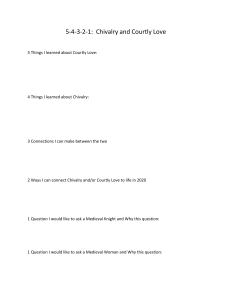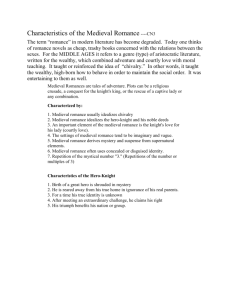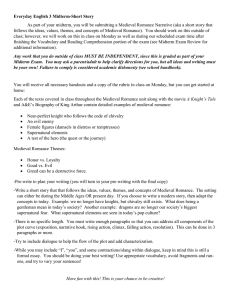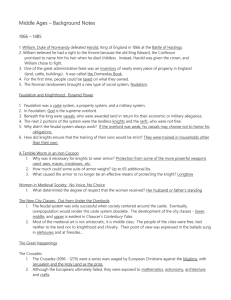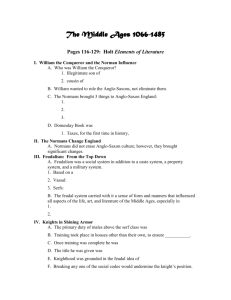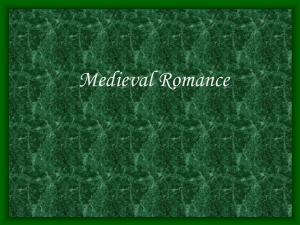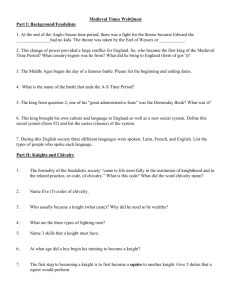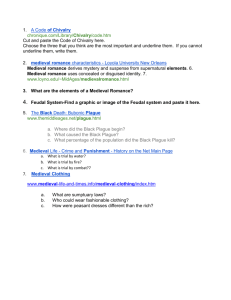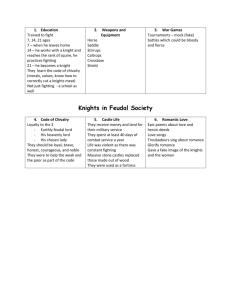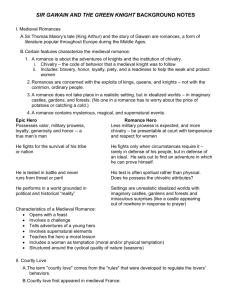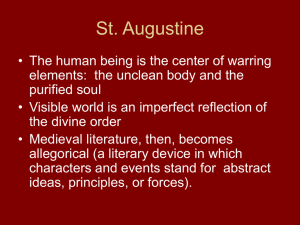Sir Gawain and the Green Knight
advertisement
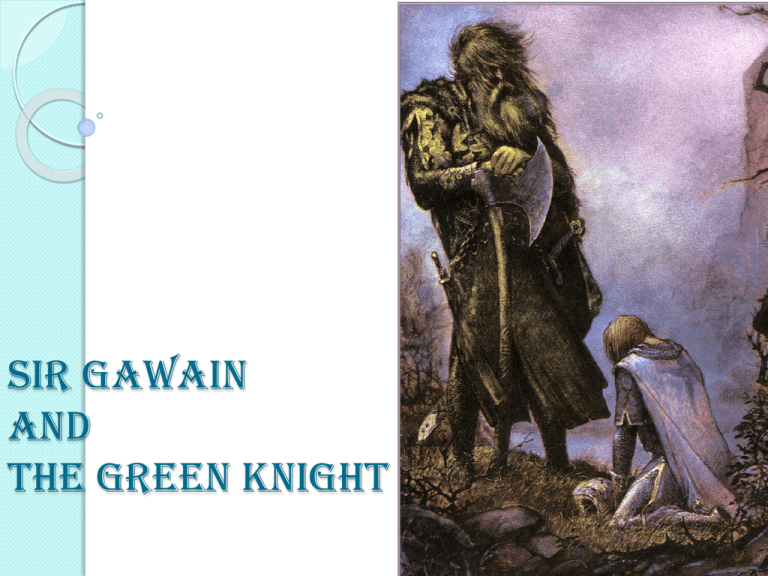
Sir Gawain and the Green Knight Background Notes This poem intertwines three traditional medieval plots: ◦ The beheading contest. ◦ The temptation of the hero. ◦ The exchange game. Medieval Institutions Feudalism: ◦ Political structure based on loyalty.: God>King,>Lord> Knight>Vassal. ◦ If the chain is broken, then hope is broken, ultimately leading to disorder, decay and destruction. ◦ Poem looks back to the golden age of chivalry, not in a state of decay. ◦ Sir Gawain exemplifies both the physical and non-physical ideals of knighthood. Feudalism cont. Physical Ideals of Knighthood (Prowess) Non-Physical Ideas of Knighthood Strength Skill Horsemanship Courage Humility Courtesy Hot TiP! In French cheval = horse & Chevalier = knight, thus chivalry derives from a knight’s skill on horseback. Courtly Love Courtly love developed partly out of the medieval cult of Mary, which elevated women. The object of love was to be worshipped from afar as an ideal; love was suppose to be an ennobling influence Only noble people were worthy of love. Courtly love cont. Several influences built up to acceptance of courtly love: ◦ Marriages of convenience in the 8th & 16th centuries made adultery a way of life. ◦ Men had shorter life spans than women. ◦ Women could inherit and thus gain control of wealth. ◦ Men went away, leaving women in control, as they went to the Crusades to clear the holy land of infidels, starting in 1095. ◦ The belief that the lady should be treated as infinitely desirable was fostered by women and poets… Think abouT iT… The way of life portrayed in metrical romances influences real expectations and behavior. Hmmmm….sound familiar? How life is portrayed in movies, TV, songs, INFLUENCES real expectations and behavior. Leonardo DiCaprio’s "king of the world" stunt in Titanic–in which he spreads his arms and appears to be flying from the front of the ship–led dozens of young men to risk their lives on cruise liners in a bid to imitate him. The rash of mimics prompted the United States Passenger Vessels’ Association to issue a "Titanic Alert" to its members, urging them to close off the bow areas of ships. The alert was no help for a Swedish woman, however, who was presumed drowned after falling from a ferry while attempting to copy the suicide attempt of Kate Winslet’s character. (The Daily Telegraph, June 25, 1998) A five-year-old set his baby sister’s bed ablaze with a cigarette lighter, killing her and destroying his home. According to the boy’s mom, he got the idea from MTV characters Beavis and Butt-head, who play with fire and say things like "Fire is cool." In Ohio, three girls set a house on fire while attempting to copy a scene in which Beavis (or possibly Butt-head) sets fire to his buddy’s hair by igniting spray from an aerosol can. The girls, however, used the technique to set clothing on fire, not hair, and ended up burning the house. (Los Angeles Times, October 14, 1993) The Genre: Medieval Romance A tale of high adventure that can be a religious crusade, a conquest for the knight’s liege and lord or the rescue of a captive lady or any combination of God, a goodly king and a pretty girl. The name “Romance” The name “Romance” dirives from Old French (the language in which narrative was written), which is a “Romance” language, which decended from Latin, the language of the ancient Romans. Characteristics of a Romance Medieval romance usually idealizes chivalry Idealizes the hero-knight and his noble deeds. The knight’s love for his lady. The settings tend to be imaginary and vague. Medieval romance derives mystery and suspense from supernatural elements. Uses concealed or disguised identity. Repetition of the mystical number “3” or multiples of 3. Characteristics of the Hero-Knight Birth of a great hero is shrouded in mystery. He is reared away from his true home in ignorance of his real parents. For a time his true identity is unknown. After meeting an extraordinary challenge, he claims his right His triumph benefits his nation or group. Your task for today 1. 2. 3. 4. 5. 6. 7. In your small groups, discuss the two values you wrote in yesterday’s journal. Share your evidence and take notes on others’ values and evidence. Within your group, rank all the values in order of importance. No ties. Create a set of 5 interview questions regarding other values and why they were chosen. Interview others Report back. Turn in your findings/notes on this task to Mrs. Overfield. You will get these back tomorrow. Cont.
